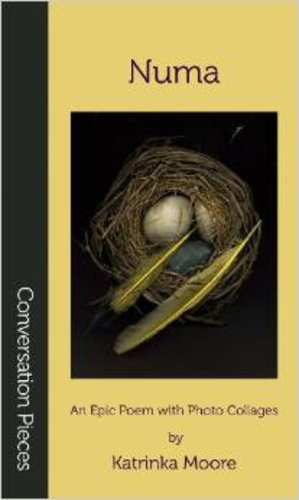FIRST LITERARY REVIEW-EAST
APRIL 2015
Book Review: Numa, by Katrinka Moore
(Aqueduct Press, 2014)
ISBN-10: 1619760576
ISBN-13: 978-1619760578
Reviewed by Sarah Stern
In Katrinka Moore’s Numa, we meet a shape-shifting creature, who’s described as,
a small body
within the open world / unlatched
a perfect example of Moore’s original way of not only describing this mesmerizing being, who will stay with you long after you’ve finished this epic poem, but of the way she is able to conjure up so much in so few words. In a way, Numa is the story of all of us, no matter who we are. That’s the brilliance here. Adding to this, there are beautiful, thought-provoking photo collages to accompany your journey, which adds a whole other layer of meaning to this unique collection.
Numa, the creature, is also wonderfully playful. At times, you want to somehow cuddle up with her/him/it too. How many poetry books elicit that response? In “Shifts,” Numa is a bear who:
licks her fur / visceral
sediment / licks away
muck & bile / pulls
apart sticky clumps
of hair / now
sound / springs up
sanguine / hopeful /
hungry
girlchild raccoon nibbles
dew-& raspberries / rises
on hind legs / paw-
hands grabbing / this
delicious life / this
summer
It’s fascinating to see how, in so many of the poems, the words actually dance across the page. Moore’s line breaks, again and again, work their magic. They work so well, you barely know how you got there, as in the second “Shifts.” By the end, you are with Numa,
/ still
in the whirling
A former dancer and choreographer, Moore manages to incorporate dance into her poetry. The movements are delicate, bold and striking, all at the same time.
There are many examples of these leaps, but “First Light” is one of my favorites.
bloom-red furrow oozes
between blue-black
sky & ash-grey
ridge / widens
warms / opens
the world / an old
old woman wakes
(again) lifts her face
Another gift of this book is Moore’s descriptions of the natural world. Again, with six words, she creates a vision that holds fast. In “Careens,” Numa moves through
The dark light of the woods.
There are also the hard truths of this life in this collection. We cheer for Numa because that’s all we can do in the face of what she encounters. And true to life, we go on.
“Rises” ends this way:
Numa
calls / concocts her
self (each cell burns) gathers rind and bone
she calls / corrals / becomes / begins again
We do, too, richer and more fully alive, for having met her.
---------------------------------------------------------------------------------------------
Katrinka Moore is the author of Numa (Aqueduct Press, 2014), Thief (BlazeVOX, 2009), and This is Not a Story (Finishing Line Press, 2003), which won the New Women’s Voices Prize. Recent work is in online journals Otoliths, MungBeing, First Literary Review-East, and Dépositions, le blog.
Sarah Stern is the author of But Today Is Different (Wipf and Stock, 2014) and Another Word for Love (Finishing Line Press, 2011). She is a four-time winner of the Bronx Council on the Arts' Poetry Award. She lives in New York City and is a senior associate at the EastWest Institute. Visit her at sarahstern.me.
